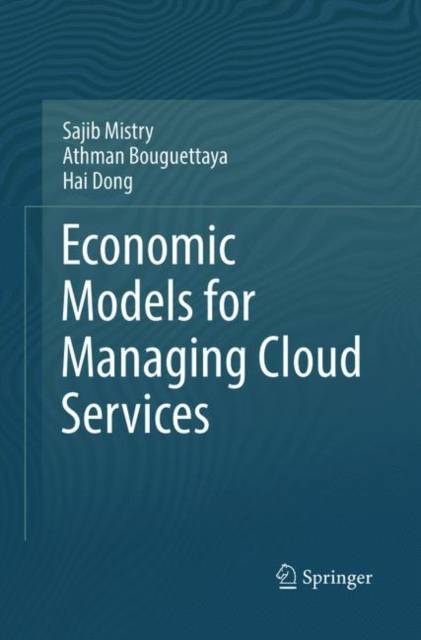
- Retrait gratuit dans votre magasin Club
- 7.000.000 titres dans notre catalogue
- Payer en toute sécurité
- Toujours un magasin près de chez vous
- Retrait gratuit dans votre magasin Club
- 7.000.0000 titres dans notre catalogue
- Payer en toute sécurité
- Toujours un magasin près de chez vous
Economic Models for Managing Cloud Services
Sajib Mistry, Athman Bouguettaya, Hai DongDescription
The authors introduce both the quantitative and qualitative economic models as optimization tools for the selection of long-term cloud service requests. The economic models fit almost intuitively in the way business is usually done and maximize the profit of a cloud provider for a long-term period.
The authors propose a new multivariate Hidden Markov and Autoregressive Integrated Moving Average (HMM-ARIMA) model to predict various patterns of runtime resource utilization. A heuristic-based Integer Linear Programming (ILP) optimization approach is developed to maximize the runtime resource utilization. It deploys a Dynamic Bayesian Network (DBN) to model the dynamic pricing and long-term operating cost. A new Hybrid Adaptive Genetic Algorithm (HAGA) is proposed that optimizes a non-linear profit function periodically to address the stochastic arrival of requests. Next, the authors explore the Temporal Conditional Preference Network (TempCP-Net) as the qualitative economic model to represent the high-level IaaS business strategies. The temporal qualitative preferences are indexed in a multidimensional k-d tree to efficiently compute the preference ranking at runtime. A three-dimensional Q-learning approach is developed to find an optimal qualitative composition using statistical analysis on historical request patterns.
Finally, the authors propose a new multivariate approach to predict future Quality of Service (QoS) performances of peer service providers to efficiently configure a TempCP-Net. It discusses the experimental results and evaluates the efficiency of the proposed composition framework using Google Cluster data, real-world QoS data, and synthetic data. It also explores the significance of the proposed approach in creating an economically viable and stable cloud market.
This book can be utilized as a useful reference to anyone who is interested in theory, practice, and application of economic models in cloud computing. This book will be an invaluable guide for small and medium entrepreneurs who have invested or plan to invest in cloud infrastructures and services. Overall, this book is suitable for a wide audience that includes students, researchers, and practitioners studying or working in service-oriented computing and cloud computing.
Spécifications
Parties prenantes
- Auteur(s) :
- Editeur:
Contenu
- Nombre de pages :
- 141
- Langue:
- Anglais
Caractéristiques
- EAN:
- 9783319892603
- Date de parution :
- 09-06-19
- Format:
- Livre broché
- Format numérique:
- Trade paperback (VS)
- Dimensions :
- 155 mm x 235 mm
- Poids :
- 453 g

Les avis
Nous publions uniquement les avis qui respectent les conditions requises. Consultez nos conditions pour les avis.






